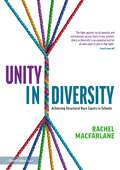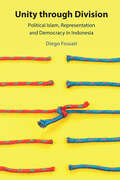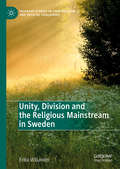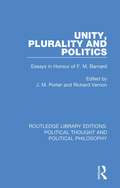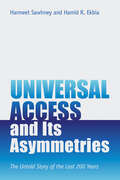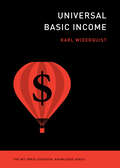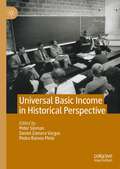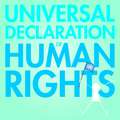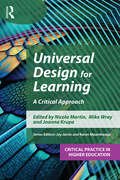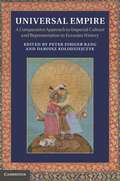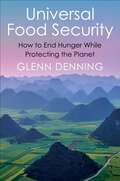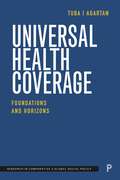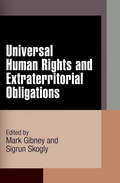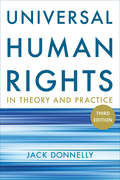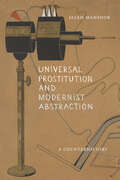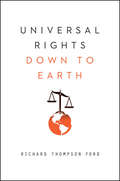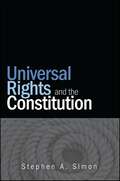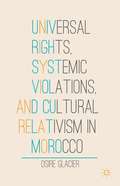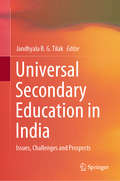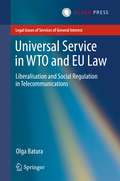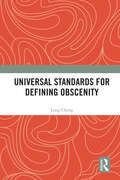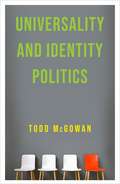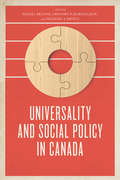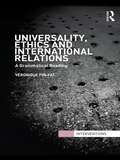- Table View
- List View
Unity in Diversity: Achieving Structural Race Equity in Schools
by Rachel MacfarlaneA third of all children in our schools are from racially minoritised backgrounds. Yet the data on attainment, exclusion, progression and representation indicates that our education system is structurally racist. Unity in Diversity explores the unconscious biases at play in our schools and demonstrates how educators can address this by improving representation in the curriculum, staffroom and on the governing/trust board. Drawing on case studies from leaders, this book demonstrates what schools are already doing to create an impactful anti-racist ethos and how these strategies may be applied in practice. Written by an experienced headteacher who has supported a diverse range of schools in improving their race equity, each chapter addresses a different aspect of race inequality and provides practical strategies for overcoming it. This book empowers readers: To acknowledge that systemic race inequality exists in schools and that this necessitates an anti-racist approach To become comfortable talking about race and to create safe spaces for staff and students to engage in discussions about race To address unconscious biases and white fragility and to examine the inequality and underrepresentation of ethnic groups To audit all aspects of educational provision to determine what needs to change and to action and implement this change with lasting impact. Schools and teachers can play a major role in eliminating systemic racism in society. This book is an essential read for any teacher, leader, governor or trustee who is restless to address race inequity in our education system, creating a more equal and represented school community.
Unity in Faith?: Edinoverie, Russian Orthodoxy, and Old Belief, 1800–1918
by J. M. WhiteThe little known history of an attempt to end a religious schism in imperial Russia, and the questions it raised about church and state.Established in 1800, edinoverie (translated as “unity in faith”) was intended to draw back those who had broken with the Russian Orthodox Church over ritual reforms in the seventeenth century. Called Old Believers, they had been persecuted as heretics. In time, the Russian state began tolerating Old Believers in order to lure them out of hiding and make use of their financial resources as a means of controlling and developing Russia’s vast and heterogeneous empire.However, the Russian Empire was also an Orthodox state, and conversion from Orthodoxy constituted a criminal act. So, which was better for ensuring the stability of the Russian Empire: managing heterogeneity through religious toleration, or enforcing homogeneity through missionary campaigns? Edinoverie remained contested and controversial throughout the nineteenth and early twentieth centuries, as it was distrusted by both the Orthodox Church and the Old Believers themselves. The state reinforced this ambivalence, using edinoverie as a means by which to monitor Old Believer communities and employing it as a carrot to the stick of prison, exile, and the deprivation of rights.In Unity in Faith?, James White’s study of edinoverie offers an unparalleled perspective of the complex triangular relationship between the state, the Orthodox Church, and religious minorities in imperial Russia.
Unity through Division: Political Islam, Representation and Democracy in Indonesia
by Diego FossatiIndonesia, like many other countries around the world, is currently experiencing the process of democratic backsliding, marked by a toxic mix of religious sectarianism, polarization, and executive overreach. Despite this trend, Indonesians have become more, rather than less, satisfied with their country's democratic practice. What accounts for this puzzle? Unity Through Division examines an overlooked aspect of democracy in Indonesia: political representation. In this country, an ideological cleavage between pluralism and Islamism has long characterized political competition. This cleavage, while divisive, has been a strength of Indonesia's democracy, giving meaning to political participation and allowing a degree of representation not often observed in young democracies. While the recent resurgence of radical Islam and political polarization in Indonesian politics may have contributed to democratic erosion, these factors have simultaneously clarified political alternatives and improved perceptions of representation, in turn bolstering democratic participation and satisfaction. This compelling book effectively challenges the wisdom of the role of Islam in Indonesian political life and provides a fresh analysis for debates on democratic backsliding in Indonesia and beyond.
Unity, Division and the Religious Mainstream in Sweden (Palgrave Studies in Lived Religion and Societal Challenges)
by Erika WillanderThis book presents new conceptual and methodological approaches to studying religiosity in Europe. From her unique background of working with the Church of Sweden statistics and official statistics on the increasing religious diversity in Sweden, Willander illustrates how previous and current methods of analysing religiosity overlook substantial aspects in patterns of affiliation, belief and practice. Unity, Division and the Religious Mainstream in Sweden draws on the sociological imagination in the sociology of religion to offer a new and empirically-driven analytical framework that shifts the focus to religious change in general, and will contribute greatly to ongoing discussions about majority forms of religiosity and their social relevance in contemporary times. It will be of use to students and scholars with a focus on the sociology of religion, as well as sociology, political science, epistemology and media studies.
Unity, Plurality and Politics: Essays in Honour of F. M. Barnard (Routledge Library Editions: Political Thought and Political Philosophy #46)
by Richard Vernon J. M. PorterFirst published in 1986. Nations have a unity often described as 'cultural'; and within them there are divergences some of which are termed 'political'. But culture and politics do not, therefore, comprise two wholly distinct zones or orders of experience, the one marked by unity, the other by plurality. Unity and plurality interpenetrate. These insights, which derive from the thinking of Herder, have been fundamental to the work of F. M. Barnard. In this volume a number of scholars contribute, in Barnardian vein, reflections on the tensions between unity and plurality in the history of ideas. The central underlying question is, in essence, ’what is the context of political life?’ The question remains of more importance than any single answer.
Universal Access and Its Asymmetries: The Untold Story of the Last 200 Years (Information Policy)
by Hamid R. Ekbia Harmeet SawhneyA framework for understanding the totality of costs and benefits of universal access that will foster honest appraisal and guide the development of good policies.Universal access—the idea that certain technologies and services should be extended to all regardless of geography or ability to pay—evokes ideals of democracy and equality that must be reconciled with the realities on the ground. The COVID-19 pandemic raised awareness of the need for access to high-speed internet service in the United States, but this is just the latest in a long history of debates about what should be made available and to whom. Rural mail delivery, electrification, telephone service, public schooling, and library access each raised the same questions as today&’s debates about health care and broadband. What types of services should be universally available? Who benefits from extending these services? And who bears the cost? Stepping beyond humanitarian arguments to conduct a clear-eyed, diagnostic analysis, this book offers some surprising conclusions. While the conventional approach to universal access looks primarily at the costs to the system and the benefits to individuals, Harmeet Sawhney and Hamid Ekbia provide a holistic perspective that also accounts for costs to individuals and benefits for systems. With a comparative approach across multiple cases, Universal Access and Its Asymmetries is an essential exploration of the history, costs, and benefits of providing universal access to technologies and services. With a fresh perspective, it overturns common assumptions and offers a foundation for making decisions about how to extend service—and how to pay for it.
Universal Basic Income (The MIT Press Essential Knowledge series)
by Karl WiderquistAn accessible introduction to the simple (yet radical) premise that a small cash income, sufficient for basic needs, ought to be provided regularly and unconditionally to every citizen.The growing movement for universal basic income (UBI) has been gaining attention from politics and the media with the audacious idea of a regular, unconditional cash grant for everyone as a right of citizenship. This volume in the Essential Knowledge series presents the first short, solid UBI introduction that is neither academic nor polemic. It takes a position in favor of UBI, but its primary goal remains the provision of essential knowledge by answering the fundamental questions about it: What is UBI? How does it work? What are the arguments for and against it? What is the evidence?Karl Widerquist discusses how UBI functions, showing how it differs from other redistributional approaches. He summarizes the common arguments for and against UBI and presents the reasons for believing it is a tremendously important reform. The book briefly discusses the likely cost of UBI; options for paying for it; the existing evidence on the probable effects of UBI; and the history of UBI from its inception more than two hundred years ago through the two waves of support it received in the twentieth century to the third and largest wave of support it is experiencing now. Now more than ever, conditions in much of the world are ripe for such enthusiasm to keep growing, and there are good reasons to believe that this current wave of support will eventually lead to the adoption of UBI in several countries around the world—making this volume an especially timely and necessary read.
Universal Basic Income in Historical Perspective
by Peter Sloman Daniel Zamora Vargas Pedro Ramos PintoThis new edited collection brings together historians and social scientists to engage with the global history of Universal Basic Income (UBI) and offer historically-rich perspectives on contemporary debates about the future of work. In particular, the book goes beyond a genealogy of a seemingly utopian idea to explore how the meaning and reception of basic income proposals has changed over time. The study of UBI provides a prism through which we can understand how different intellectual traditions, political agents, and policy problems have opened up space for new thinking about work and welfare at critical moments.Contributions range broadly across time and space, from Milton Friedman and the debate over guaranteed income in the post-war United States to the emergence of the European basic income movement in the 1980s and the politics of cash transfers in contemporary South Africa. Taken together, these chapters address comparative questions: why do proposals for a guaranteed minimum income emerge at some times and recede into the background in others? What kinds of problems is basic income designed to solve, and how have policy proposals been shaped by changing attitudes to gender roles and the boundaries of social citizenship? What role have transnational networks played in carrying UBI proposals between the global north and the global south, and how does the politics of basic income vary between these contexts?In short, the book builds on a growing body of scholarship on UBI and lays the groundwork for a much richer understanding of the history of this radical proposal.
Universal Declaration Of Human Rights
by Yacine A T Kaci United Nations StaffThe Universal Declaration of Human Rights (UDHR) is the first international agreement setting out freedoms, rights and entitlements for all humanity to claim. It emphasizes the inextricable relationship between fundamental freedoms and social justice, and their connection with peace and security. This edition of the UDHR is published in collaboration with French artist, graphic designer and creator of popular cartoon Elyx, Yacine A t Kaci (alias YAK) to illustrate the 30 articles. This hardbound edition is available in English and French.
Universal Design for Learning: A Critical Approach (Critical Practice in Higher Education)
by Nicola Martin Mike Wray Joanna KrupaCritical Practice in Higher Education provides a scholarly and practical entry point for academics into key areas of higher education practice. Each book in the series explores an individual topic in depth, providing an overview in relation to current thinking and practice, informed by recent research. The series will be of interest to those engaged in the study of higher education, those involved in leading learning and teaching or working in academic development, and individuals seeking to explore particular topics of professional interest.This essential text focuses on the principles of Universal Design for Learning (UDL) and how they should underpin thinking in embedding inclusive practice. The Covid-19 pandemic meant the higher education sector had to rethink curriculum delivery and now has the opportunity to build on this momentum towards full UDL. The book translates the principles of UDL into research-informed inclusive practice, looking at UDL from the perspectives of various marginalised groups, including but not limited to categories protected by the Equality Act 2010. Curriculum content and delivery is considered as well as factors such as digital poverty. Readers are invited to consider a more nuanced understanding of teaching and learning which celebrates and accommodates diversity.
Universal Empire
by Peter Fibiger Bang Dariusz KołodziejczykThe claim by certain rulers to universal empire has a long history stretching as far back as the Assyrian and Achaemenid Empires. This book traces its various manifestations in classical antiquity, the Islamic world, Asia and Central America as well as considering seventeenth- and eighteenth-century European discussions of international order. As such it is an exercise in comparative world history combining a multiplicity of approaches, from ancient history, to literary and philosophical studies, to the history of art and international relations and historical sociology. The notion of universal, imperial rule is presented as an elusive and much coveted prize among monarchs in history, around which developed forms of kingship and political culture. Different facets of the phenomenon are explored under three, broadly conceived, headings: symbolism, ceremony and diplomatic relations; universal or cosmopolitan literary high-cultures; and, finally, the inclination to present universal imperial rule as an expression of cosmic order.
Universal Food Security: How to End Hunger While Protecting the Planet
by Glenn DenningWhat would it take to achieve a genuinely food-secure world—one without hunger or malnutrition, where everyone gets to consume the right quantity and quality of food to live a healthy, active, and productive life? Bringing about such a future requires transforming how our food is grown, managed, and distributed. From production to consumption, food systems must be sustainable, halting environmental degradation and even repairing the damage we have previously done.This book provides an accessible guide to making healthy diets from sustainable food systems available to all. Glenn Denning bridges the divisive worlds of science, policy, and practice. He synthesizes the most relevant literature and shares personal perspectives and insights gained over four decades working in more than fifty countries, coupled with the real-world experience of hundreds of leading experts. Universal Food Security lays out key priorities—sustainable intensification, market infrastructure, postharvest stewardship, healthy diets, and social protection—and presents how to achieve food systems transformation.Denning identifies the education and development of practitioner-leaders as the critical trigger of change. Universal Food Security informs and inspires those leaders—acting on their own and with others through institutions—to achieve a food-secure world. This book is an ideal handbook for students and practitioners looking to transform our food systems at all levels.
Universal Health Coverage: Foundations and Horizons (Research in Comparative and Global Social Policy)
by Tuba I. AgartanThis book traces the origins of Universal Health Coverage (UHC) in the broader context of universalism since the beginning of the 20th century. UHC aims to improve access to essential health services, provide financial protection and overcome health care inequities. Drawing on rich first-hand data, including expert interviews and archival research, this book adopts a historical–sociological methodology to analyse some of UHC’s key political dynamics: consensus, conflicts, negotiations and struggles. It reveals that UHC is the result of a unique conjoining of movements in health, debates on human rights and concerns with development in a particular world context across the Global North and Global South.
Universal Human Rights and Extraterritorial Obligations
by Mark Gibney Sigrun SkoglyGlobalization challenges fundamental principles governing international law, especially with respect to state sovereignty and international relations. This transformation has had a significant impact on the practice of trade law, financial regulation, and environmental law but relatively little effect on one area of law and regulation: human rights.Universal Human Rights and Extraterritorial Obligations examines both the international and domestic foundations of human rights law. What other contemporary human rights debates have almost totally ignored is that in an increasingly interdependent world--where public and private international actors have great influence on the lives of individuals everywhere--it is insufficient to assess only the record of domestic governments in human rights. It is equally important to assess the effect of actions taken by intergovernmental organizations, international private entities, and foreign states.From this standpoint, contributors to this book address how states' actions or omissions may affect the prospects of individuals in foreign states and asks important questions: To what extent do agricultural policies of rich countries influence the right to food in poorer countries? How do decisions to screen asylum seekers outside state borders affect refugee rights? How does cooperation among different states in the "war on terror" influence individuals' rights to be free from torture? This volume presents a brief for a more complex and updated approach to the protection of human rights worldwide.
Universal Human Rights in Theory and Practice (third edition)
by Jack Donnellyintroduction to the concept and applications of human rights
Universal Prostitution and Modernist Abstraction: A Counterhistory
by Jaleh MansoorIn Universal Prostitution and Modernist Abstraction, Jaleh Mansoor provides a counternarrative of modernism and abstraction and a reexamination of Marxist aesthetics. Mansoor draws on Marx’s concept of prostitution—a conceptual device through which Marx allegorized modern labor—to think about the confluences of generalized and gendered labor in modern art. Analyzing works ranging from Édouard Manet’s Olympia and Georges Seurat’s The Models to contemporary work by Hito Steyerl and Hannah Black, she shows how avant-garde artists can detect changing modes of production and capitalist and biopolitical processes of abstraction that assign identities to subjects in the interest of value’s impersonal circulation. She demonstrates that art and abstraction resist modes of production and subjugation at the level of process and form rather than through referential representation. By studying gendered and generalized labor, abstraction, automation, and the worker, Mansoor shifts focus away from ideology, superstructure, and culture toward the ways art indexes crisis and transformation in the political economic base. Ultimately, she traces the outlines of a counterpraxis to capital while demonstrating how artworks give us a way to see through the abstractions of everyday life.
Universal Rights Down to Earth (Norton Global Ethics Series)
by Richard Thompson FordA path-blazing lesson on how to reconcile lofty human rights ambitions with political and cultural realities. The idea of universal rights--rights shared by all citizens, regardless of nationality, creed, wealth, or geography--has a powerful grip on the way many people feel about justice and global politics. No one should be subjected to torture or disappearance, to starvation or sex trafficking, to economic exploitation or biased treatment under the law. But when it comes to actually enforcing these rights, the results rarely resemble the ideal. In Universal Rights Down to Earth, acclaimed author and legal expert Richard Thompson Ford reveals how attempts to apply "universal" human rights principles to specific cultures can hinder humanitarian causes and sometimes even worsen conditions for citizens. In certain regions, human rights ideals clash with the limits of institutional capabilities or civic culture; elsewhere, rights enforcement leads to further human rights violations. And in some countries, offending regimes use human rights commitments to distract attention from or justify their other abuses. Ford explores how our haste to identify every ideal as a universal right devalues rights as a whole, so that even the most important protections--such as that against torture--become negotiable. In clear, persuasive prose, Ford explores cases ranging from food distribution to the poor in India to sex work in Japan, illustrating how a rights-based approach to these problems often impedes more effective measures--the pragmatic politics of cost weighing, compromise, and collective action. The bad news is that improving lives worldwide isn't as easy as making a declaration. But the good news, as Universal Rights Down to Earth powerfully demonstrates, is that if we are clear-eyed and culturally aware, it can be done.
Universal Rights and the Constitution (SUNY series in American Constitutionalism)
by Stephen A. SimonAre constitutional rights based exclusively in uniquely American considerations, or are they based at least in part on principles that transcend the boundaries of any particular country, such as the requirements of freedom or dignity? By viewing constitutional law through the prism of this fundamental question, Universal Rights and the Constitution exposes an overlooked difficulty with opinions rendered by the Supreme Court, namely, an inherent ambiguity about the kinds of arguments that count in constitutional interpretation, which weakens the foundations of our most cherished rights.Rejecting current debates over constitutional interpretation as flawed, Stephen A. Simon offers an innovative framework designed to provide clearer foundations for rights interpretations while preserving a meaningful but limited role for universal arguments. He reveals the vital connections among contemporary debates over such matters as the right to privacy, the constitutionality of the death penalty, and the role of foreign law in constitutional interpretation.
Universal Rights, Systemic Violations, and Cultural Relativism in Morocco
by Osire GlacierThis study explores the role played by the Moroccan state in the drafting process of the Convention against Torture and Other Cruel, Inhuman, or Degrading Treatment or Punishment. Author Osire Glacier examines whether universal rights follow logically from the colonial experience and exist as a form of cultural imperialism. By juxtaposing the Moroccan state's systemic practice of torture with its discourse of cultural relativism, she reveals that popular resistance to universal rights, expressed via discourses of relativism and cultural authenticity, correspond to a deliberate form of politics aimed at delegitimizing those very same rights. Ultimately, she challenges critics condemning universal rights as neocolonial to produce new perspectives that can support a more inclusive system protecting universal rights.
Universal Secondary Education in India: Issues, Challenges and Prospects
by Jandhyala B. G. TilakThis book offers a cutting-edge contribution on the importance of secondary education and assesses the strengths and weaknesses of its growth in India. Secondary education, long neglected, faces countless challenges and will require tremendous financial resources, millions of additional trained teachers, and vast infrastructure in terms of buildings, laboratories, libraries, ICT facilities, etc. The book examines these critical issues, with particular reference to the situation in India. It analyses the status quo of secondary education and discusses the strategies and approaches needed in order to universalize it. Including 20 chapters authored by eminent scholars in the field and from across the country, this book gathers the outcomes of a seminar organized by the Council for Social Development on Universalization of Secondary Education. The target audience includes policymakers, practitioners, administrators, education planners, researchers, teachers, and teacher educators with an interest in the future of secondary education.
Universal Service in WTO and EU law
by Olga BaturaThis book is a systematic comparative study of WTO and EU law relevant for universal service provision, and a timely contribution to the ongoing scholarly and policy debates about the concept and scope of universal service. Universal service is one of the most significant regulatory issues worldwide and it is likely to remain so. The central question dealt with by the author is how the technologically intensive sector of telecommunications services can be regulated in a socially fair way in the light of liberalisation and the immense importance of ICTs in the Information Society. The author investigates whether the legal frameworks of WTO and EU can meet the challenges of the rapid and dramatic technological and social change and formulates relevant policy recommendations. The book is of interest to both scholars and practitioners in several disciplines, such as EU and WTO law, telecommunications law and regulation, political science regarding market regulation and governance as well as European integration and WTO. Olga Batura is affiliated to the Leuphana Law School, University of Lüneburg, Germany, and to the European Humanities University in Vilnius, Lithania.
Universal Standards for Defining Obscenity
by Long ChengIn the existing literature, there is no universal standard for defining obscenity. The book aims to demonstrate that there indeed exist underlying universal standards for defining obscenity (USDOs). However, their application to different contexts of time, place, and culture, may legitimately result in varied manifestations.The author examines a definition of obscenity proposed by the political and legal theorist Harry M. Clor, within John Finnis’ natural law theoretical framework. He also explores how positive law, including legislation, case law, and customary law, should respond to the proposed USDOs. The book addresses the theoretical foundation of the determination and regulation of obscenity, and it is supplemented with examples of legal practices from several jurisdictions, such as the United States, the United Kingdom, Canada, and Germany.The book will appeal to scholars of legal philosophy, natural law theories, obscenity law, and free speech.
Universality and Identity Politics
by Todd McGowanThe great political ideas and movements of the modern world were founded on a promise of universal emancipation. But in recent decades, much of the Left has grown suspicious of such aspirations. Critics see the invocation of universality as a form of domination or a way of speaking for others, and have come to favor a politics of particularism—often derided as “identity politics.” Others, both centrists and conservatives, associate universalism with twentieth-century totalitarianism and hold that it is bound to lead to catastrophe.This book develops a new conception of universality that helps us rethink political thought and action. Todd McGowan argues that universals such as equality and freedom are not imposed on us. They emerge from our shared experience of their absence and our struggle to attain them. McGowan reconsiders the history of Nazism and Stalinism and reclaims the universalism of movements fighting racism, sexism, and homophobia. He demonstrates that the divide between Right and Left comes down to particularity versus universality. Despite the accusation of identity politics directed against leftists, every emancipatory political project is fundamentally a universal one—and the real proponents of identity politics are the right wing. Through a wide range of examples in contemporary politics, film, and history, Universality and Identity Politics offers an antidote to the impasses of identity and an inspiring vision of twenty-first-century collective struggle.
Universality and Social Policy in Canada (The Johnson-Shoyama Series on Public Policy)
by Michael J. Prince Gregory Marchildon Daniel BélandBringing together top scholars in the field, Universality and Social Policy in Canada provides an overview of the universality principle in social welfare. The contributors survey the many contested meanings of universality in relation to specific social programs, the field of social policy, and the modern welfare state. The book argues that while universality is a core value undergirding certain areas of state intervention—most notably health care and education—the contributory principle of social insurance and the selectivity principle of income assistance are also highly significant precepts in practice.
Universality, Ethics and International Relations: A Grammatical Reading
by Véronique Pin-FatUniversality Ethics and International Relations introduces students to the key debates about ethics in international relations theory. This book explores the reasons why grappling with universality and ethics seems to be a profound endeavour and where we end up when we do. By offering a new way of thinking about ethics in International Relations, Pin-Fat shows that there are several varieties of universality which are offered as the answer to ethics in global politics; the divine universality of Hans Morgenthau, the ideal universality of Charles R. Beitz and the binary universality of Michael Walzer.? Taking the reader on a grammatical odyssey through each, the book concludes that profound searches for the foundations of universality can’t fulfil our deepest desires for an answer to ethics in global politics. Pin-Fat suggests that the failure of these searches reveals the ethical desirability of defending universality as (im)possible. An ideal text for use in a wide variety of courses, including ethics in international relations, international relations theory, and international political theory, this work provides a valuable new contribution to this rapidly developing field of research.
